Eating well while breastfeeding supports both you and your baby, though sometimes it is harder than expected. Sometimes exhaustion makes it harder to eat balanced meals. Other times you may forget to eat because you are so focused on your new baby.
Eating a well-balanced diet while breastfeeding helps with energy levels, milk supply, and postpartum recovery while providing nutrition for your baby.
Whether you are exclusively breastfeeding, pumping or combining breastmilk and formula, it takes energy and nutrients to feed your baby.
Remember, your body is working hard to produce breast milk and refueling your body is important.
Best Foods to Eat While Breastfeeding
Eating nutrient-dense foods can help you feel your best while ensuring your baby gets essential vitamins and minerals.
- Protein: Lean meats, eggs, fish, beans, lentils, dairy
- Healthy fats: Avocados, nuts, seeds, olive oil, salmon
- Whole grains: Oatmeal, brown rice, whole wheat bread, quinoa
- Fruits & vegetables: Leafy greens, berries, carrots, sweet potatoes
- Dairy or fortified alternatives: Milk, yogurt, cheese, plant-based options
- Food with iodine and choline: dairy, eggs, seafood, iodized salt, beans, peas
Eating a variety of these foods helps ensure you’re getting enough vitamins and minerals for both you and your baby while supporting overall lactation.
I remind myself to eat protein, fats and carbs with each meal and most snacks. My goal is to eat a variety of vegetables and fruits with different colors throughout the day.
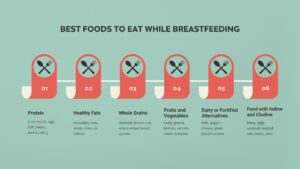
Tip: Stock up on food that you can eat with one hand. You will likely need to eat while breastfeeding, pumping or bottle feeding. Keep a stash of snacks nearby. My favorites were protein bars and nuts, and refrigerated snacks like yogurt and granola or carrots and hummus.
How Much Water Should I Drink While Breastfeeding?
Hydration is very important while breastfeeding! Your body produces somewhere around 750 ml of milk per day and replenishing your fluid is crucial.
While mild dehydration is not likely to affect milk supply, it is important to focus on adding in more fluid to support you and your baby.
It is recommended to drink about 16 cups of water per day! That means you should be drinking 128 ounces or a little bit less than 4 liters per day.
You can get extra hydration via soups, smoothies, coconut water, and certain fruits.
Drink to your thirst levels and make sure your urine is pale yellow, not dark.
Do I Need More Calories While Breastfeeding?
Yes, breastfeeding increases your energy needs. Most moms need an additional 300-500 calories per day to maintain milk supply and energy levels
- Choose healthy, nutrient-dense foods like nuts, yogurt, avocados, whole grains, and lean proteins
- Listen to your body—hunger cues will help guide your intake
What Foods Are Good for Breast Milk Supply?
Some foods may help support milk production, but frequent nursing and proper hydration are the most important factors.
Breastmilk production works by supply and demand. While some foods may help temporarily boost milk production, effective milk removal is always more important.
The following foods may work in your favor to temporarily boost milk production:
- Oatmeal: Though there is no scientific evidence that oatmeal boosts milk supply, it offers a source of nutrients for a nursing mom. Many moms choose to eat oatmeal during early lactation.
- Flaxseeds: Contain omega-3s and phytoestrogens that may support lactation.
- Brewer’s yeast: A common ingredient in lactation products, rich in B vitamins.
Lactation cookies and teas often contain these ingredients, but research on their effectiveness is limited. The best way to maintain supply is to nurse or pump regularly and eat enough calories.
Foods to Avoid While Breastfeeding
Most foods are safe, but some may cause discomfort for your baby or impact milk production:
- High-mercury fish: Limit swordfish, shark, king mackerel, and tilefish
- Alcohol: If drinking, wait at least 2 hours before nursing
- Excessive caffeine: More than 300 mg (2-3 cups of coffee) may affect baby’s sleep
- Certain herbs: Peppermint, parsley and sage have been linked with decreased milk supply, though parents would have to eat very large amounts to have any effect.
Luckily this isn’t much of a change from pregnancy!
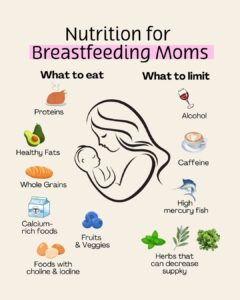
Should I Take Vitamins or Supplements While Breastfeeding?
It depends! A well-balanced diet provides most nutrients, but some moms may need supplements:
- Prenatal vitamins: Continuing after birth ensures you get key nutrients.
- Vitamin D: Breastfed babies need supplementation; moms may benefit too. Moms need 6400 iu to transfer into breastmilk in high enough quantities.
- Iron: Important if you experienced significant blood loss during delivery.
Breastfeeding mothers eating a vegan diet may need vitamin B12 supplementation since it is primarily found in meat.
If you’re unsure, ask your healthcare provider about what’s best for you.
Can I Drink Caffeine While Breastfeeding?
Good news! Sleep deprivation is hard, but you can drink caffeine in moderation while breastfeeding. About 1% of the caffeine you consume passes into breast milk, but most babies tolerate small amounts well.
Up to 300 mg per day (about 2-3 cups of coffee) is generally considered safe.
Can I Drink Alcohol While Breastfeeding?
It is okay to drink alcohol in moderation while breastfeeding. Alcohol passes into breast milk at the same level as in your blood
Here are important concepts about alcohol and breastfeeding to understand:
- Consider nursing right before having a drink. Alcohol peaks between 30-45 minutes after drinking. The recommendation is to wait at least 2 hours per drink before nursing or pumping.
- “Pumping and dumping” doesn’t remove alcohol from your milk faster since alcohol is in the blood stream.
- Moderate drinking (1 drink a day) is unlikely to harm your baby.
If you plan to drink, feeding beforehand or having expressed milk on hand can help.
Tip: Sometimes alcohol can impair the milk ejection reflex or “let-down” so there may be less milk for your baby to eat.
Can I Try to Lose Weight While Breastfeeding?
Yes, you can try to lose weight while breastfeeding, but it’s important to do it gradually. Breastfeeding burns extra calories, so extreme dieting can impact energy and milk supply:
- A slow and steady weight loss of 1-2 pounds per week is safe
- Focus on nutrient-dense foods instead of cutting too many calories
- Stay active, but wait to get the go-ahead from your OB or midwife before resuming strenuous exercise
Watch out, though, some women report having a decrease in milk supply if they are not eating enough calories per day.
Eating well while breastfeeding doesn’t have to be complicated. Focus on balanced meals, stay hydrated, and listen to your body’s needs. If you have concerns about diet, weight loss, or milk supply, a lactation consultant, dietitian or healthcare provider can help!
Sources:
- https://www.cdc.gov/breastfeeding-special-circumstances/hcp/diet-micronutrients/maternal-diet.html
- Academy of Nutrition and Dietetics (2022). “Breastfeeding and Nutrition.”
- American Academy of Pediatrics (2022). “Breastfeeding Guidelines.”
- La Leche League International (2021). “Foods That Support Milk Production.”
- Centers for Disease Control and Prevention (2022). “Breastfeeding and Alcohol.”
- National Institutes of Health (2021). “Dietary Supplements and Breastfeeding.”
- American College of Obstetricians and Gynecologists (2021). “Caffeine and Pregnancy/Breastfeeding.”
- https://www.eatright.org/health/pregnancy/breastfeeding-and-formula/nursing-your-baby-what-you-eat-and-drink-matters
Pin This for Later:
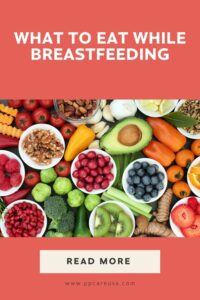
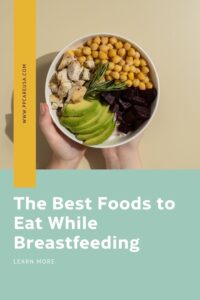
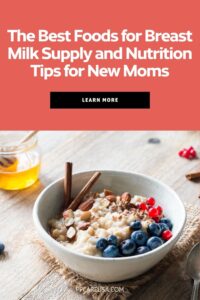
 Erin Moore is a pediatric nurse practitioner, certified lactation counselor and the mom of 2 boys in Austin, TX. Erin believes all moms deserve judgment-free feeding support throughout the entire feeding journey – even if it does not go as planned. Erin’s goal is to reduce the stress on new moms while ensuring the baby gets the nutrients they need to grow and thrive. Erin provides comprehensive education and realistic goal setting to help parents feed their babies from breast to bottle to first foods and on.
Erin Moore is a pediatric nurse practitioner, certified lactation counselor and the mom of 2 boys in Austin, TX. Erin believes all moms deserve judgment-free feeding support throughout the entire feeding journey – even if it does not go as planned. Erin’s goal is to reduce the stress on new moms while ensuring the baby gets the nutrients they need to grow and thrive. Erin provides comprehensive education and realistic goal setting to help parents feed their babies from breast to bottle to first foods and on.
For more information, visit Erin’s website: https://www.babyfeedingcoach.com/
Postnatal Depletion
Meet the Team
Our Services
Supplements
A virtual healthcare clinic that helps postpartum mamas recover from postnatal depletion syndrome with a holistic approach.
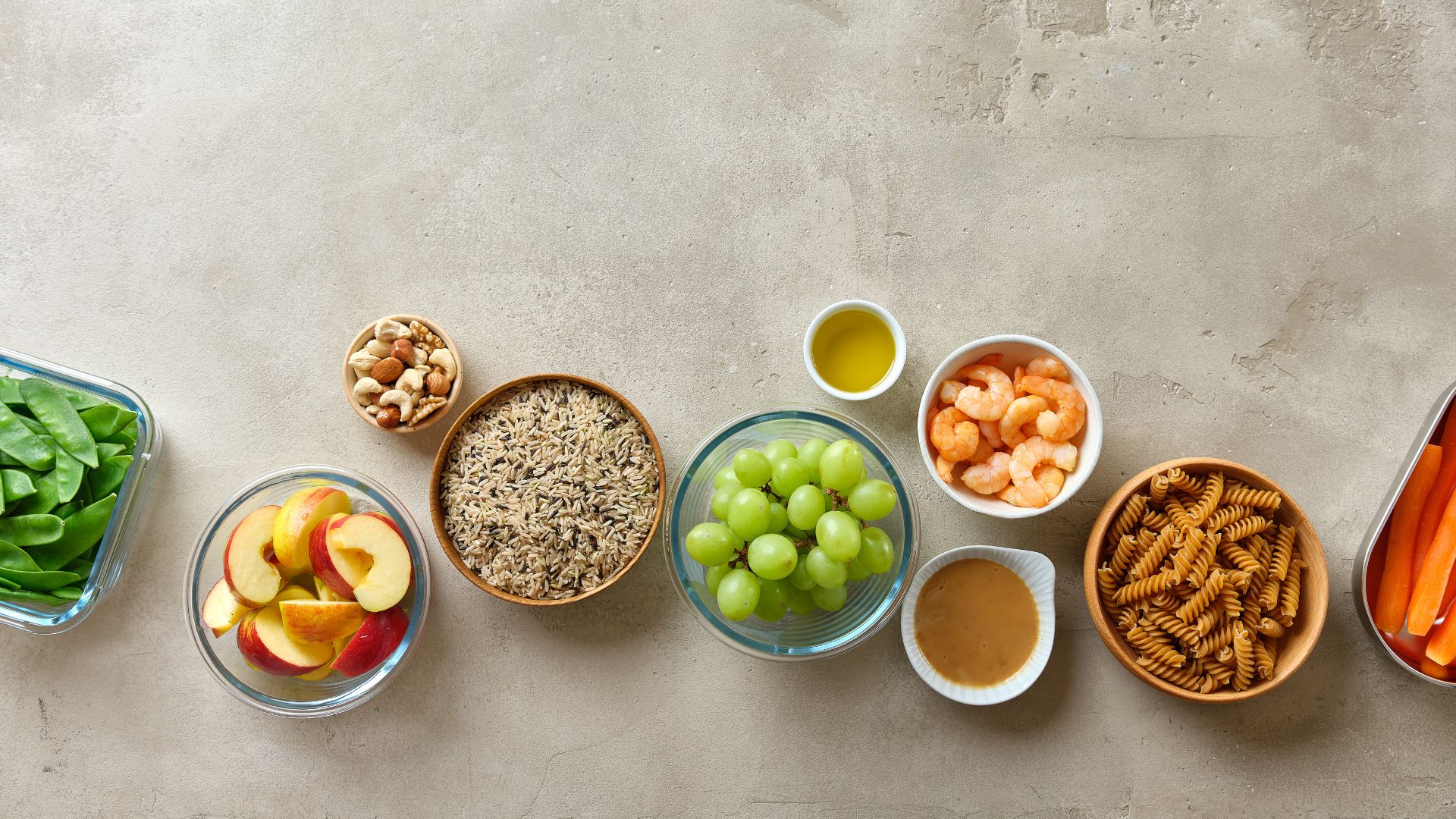
Get in touch